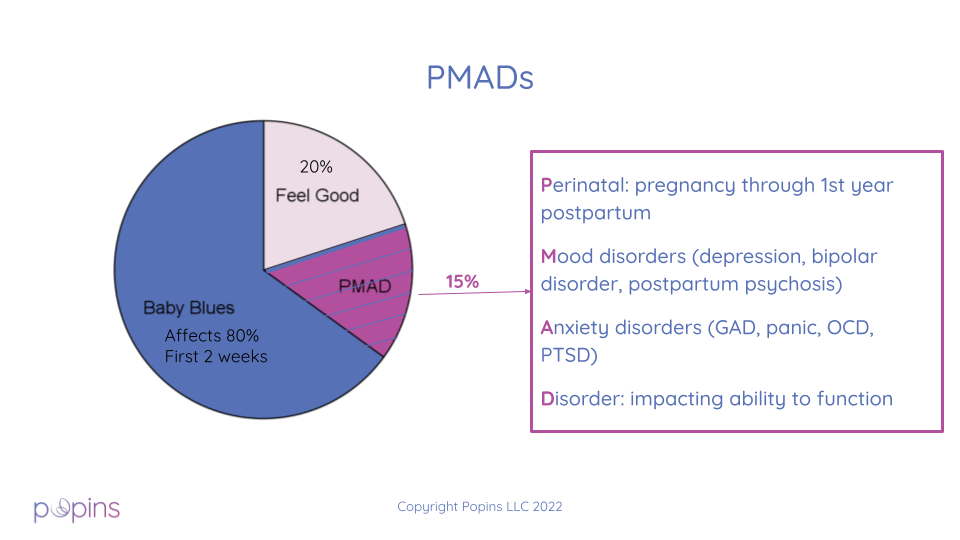
Mental Health Check-In
Oct 19, 2022Special thanks to Sara Kind, LMFT, LPC and founder of Kind Therapy for contributing to this article.
What emotions are prevailing for you?
Love. Connection. Joy. You might have expected these to be the prevailing emotions as a new parent getting to know your new baby. For some parents, they are; and we hope you are feeling some good doses of those feelings!
The Baby Blues
And also…up to 80% of women experience feelings of anxiety, worry and unhappiness shortly after childbirth. Commonly called “The Baby Blues”, these feelings result from fluctuating hormones after birth and sleep deprivation.
Common Baby Blue feelings of tearfulness, exhaustion, heightened emotional sensitivity and overwhelm tend to peak around days 3-5 after birth…ya know, right around when most parents bring their baby home. According to the PSI Components of Care Manual, birth moms experiencing Baby Blues are often still predominantly happy; and self-esteem remains unchanged. You may hear yourself say, “I don’t know why I’m crying but I can’t stop crying.”
PMADs affect 1 in 7
Anxiety, worry, and unhappiness are prevailing emotions for 1 in 7 moms (15%!), and represent symptoms of Perinatal Mood and Anxiety Disorders (PMADs) like postpartum depression or postpartum anxiety. PMADs commonly present around 2 weeks after delivery, but may begin with high intensity shortly before or any time after childbirth, impacting the birth mom’s ability to function.
Additional risk factors for PMADs include anxiety or depression during pregnancy, history of prior mental health challenges, or a traumatic birth experience.

Without treatment, a PMAD can last for months or years. Sadness and anxiety can be extreme and interfere with your ability to care for yourself or your family. You may also feel irritable, guilty, cry more than usual, feel angry, numb and not connect with your baby. You may feel extreme worry that feels like it never stops, constantly feeling on edge, and may interfere with your ability to calm down.
The good news? PMADs are HIGHLY TREATABLE with the right kind of help.
Fathers’ Feelings
An estimated 1 in 10 dads also experience a PMAD. The symptoms for dads can look different; for example, increased substance use, irritability, hostility, and/or isolating themselves. And the timing can be different than what new moms experience; for dads, PMAD symptoms tend to peak 3-6 months postpartum.
The best way to care for your baby is to care for yourself
Ways to support your mental health BEFORE baby:
1. Proactively set up support
- If you have an existing relationship with a mental health professional, schedule out appointments (or keep them on the books) for after your expected delivery. You may want to have those first weeks post-delivery set up as virtual visits to make it easier on your physical recovery.
- Set up a virtual mental health/PMAD screening for ~3 weeks after your due date with a mental health professional.
- Some providers offer a “4th trimester package” (like Claudia Schmidt, LPC, PMH-C of New Path Wellness)
- Others are likely to schedule a proactive PMAD screening on request; talk to your healthcare provider if you need help finding available therapists in your network or area.
- Sign your key support team members (like your partner, sister, or expecting grandparents) up for Popins Grandma Camp so they are prepared to help.
2. Print our Warning Signs guide and post it somewhere easy to reference - on a wall by baby's changing table or on the fridge.
3. Reflect on small things that help YOU feel better and practice incorporating them into your daily life. For example:
- Take a few deep breaths.
- Take a (short, slow) walk outside.
- Incorporate a small mental exercise into your day that helps you feel good; whether it's a 12-minute mindful meditation, 5 minutes of journaling, or reaching out to a loved one (sending a thank you or thinking of you note, or calling to connect).
Warning Signs to Watch for & Where to Seek Help
Seek IMMEDIATE HELP from a trained professional if you, or the beloved new parent in your life is experiencing:
- Thoughts of Harming Baby or Self
- Hallucinating (seeing, hearing, or smelling things that are not there)
- Mania (a high, elated mood that often seems out of touch with reality)
- Paranoia
- Expressing delusions (thoughts or beliefs that are not true)
Immediate help resources:
- The 988 Suicide and Crisis Lifeline offers immediate support, 24/7 in English and Spanish.
- National Maternal Mental Health Hotline: free, confidential 24/7 support before, during, and after pregnancy: 1-833-9-HELP4MOMS (1-833-943-5746).
- 911 or your provider’s after hours line.
Talk with your healthcare provider if you or your partner are experiencing overwhelming tiredness/fatigue; feeling confused; feeling sad, hopeless or anxious for more than 10 days after giving birth.
Postpartum Support International provides helpful information for families (including help resources for dads!), as well as a hotline (1-800-944-4773) that anyone can call to get basic information, support, and resources. PSI returns calls and texts within 24 hours.
In Summary
-
We hope you feel great, love being a parent (most of the time), and take great joy in the new baby in your life.
-
Many new parents (80%) don't feel great. Baby blues are likely to peak & resolve within a few days post delivery. Let's collectively take gentle care to support new moms!
-
Many new parents (15%) suffer from PMADs, which are HIGHLY TREATABLE with the right kind of help. We want you to be prepared to identify the signs & symptoms, and to connect with the right help quickly, to get on a path to healthy recovery sooner.
